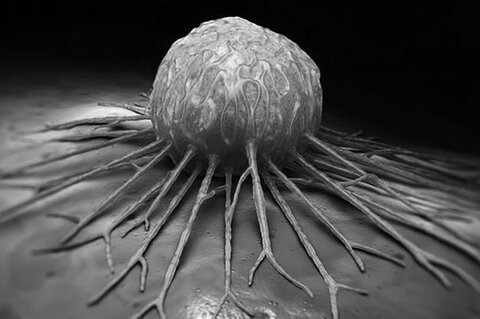Iran (IMNA) - Ghanbari-Motlagh acknowledged that although the country is still far from the ideal situation, the overall development trend has been promising. He highlighted the National Cancer Registration Program, which was launched in 2017, revealing that out of the 135,000 new cancer cases identified annually in Iran, 52 percent are men and 48 percent are women.
Breast and Prostate Cancer Identified as Most Common in Iran, Says Health Official
Breast cancer is the most prevalent form of cancer among women in Iran, while prostate cancer tops the list for men, according to a statement made by Health Official Ghanbari-Motlagh. He also highlighted that breast, prostate, colon, skin, and gastric cancers are the five most frequently diagnosed types of cancer in the country.
Ghanbari-Motlagh further explained that changes in lifestyle have resulted in a shift in cancer patterns, with prostate cancer surpassing gastric cancer in men since the Iranian calendar year 1390 (March 2011-March 2012).
Cancer-related deaths account for 16 percent of annual mortalities in Iran, totaling approximately 51,000 individuals. As a result, cancer has become the second leading cause of death in the country, trailing only cardiovascular diseases.
In terms of prevalence, around 14 percent of Iranians develop cancer at some point during their lifetime, which is lower compared to the global average of 20 percent. However, the survival rate stands at 50 percent, with 7 percent of cancer patients unfortunately succumbing to the disease.
Cancer Patients Face Higher Risk of COVID-19 Mortality, Study Finds
A recent study examining the relationship between cancer and COVID-19 reveals concerning findings. Out of a total of 3,775 reported COVID-19 cases, it was discovered that cancer patients were twice as likely to succumb to the virus compared to individuals without cancer. The study underscores the vulnerability of cancer patients in the face of the ongoing pandemic.
Furthermore, another study highlights the detrimental impact of air pollution on cancer incidence. While the exact extent remains unclear, experts assert that exposure to polluted air plays a significant role in the development of cancer. In fact, after accounting for factors such as population aging and poor lifestyle choices, air pollution emerges as the third most influential factor contributing to the occurrence of cancer.
Effective Factors to Prevent Cancer; Insurance Covers 70% of Treatment Cost
In a recent statement, an expert highlighted the crucial factors for preventing the prevalence of cancer. According to him, individuals can significantly reduce their risk by maintaining a proper weight, engaging in regular physical activity, adopting a nutritious diet, abstaining from smoking, opium, and alcohol, and increasing their consumption of fruits and vegetables.
Furthermore, it has been revealed that insurance plays a vital role in supporting cancer patients. Approximately 70 percent of the cost of cancer medicine and treatment is covered by insurance. Additionally, the Food and Drug Administration and the Ministry of Health provide subsidies to cover the remaining 30 percent of the cost, which patients are responsible for.
Cancer Cases Expected to Reach 150,000 by 2025, with Thousands of Annual Deaths
According to Reza Malekzadeh, the deputy health minister, the number of cancer cases in Iran is projected to reach 150,000 by the year 2025. Malekzadeh also noted that there are currently over 5,000 new cases per year. Additionally, he expressed concern over the high mortality rate, with 380,000 deaths occurring annually in the country. Out of these, approximately 122,000 are premature deaths, accounting for nearly 40 percent of all deaths among individuals aged 70 or younger.
Of the premature deaths, Malekzadeh highlighted that 34,000 are cancer-related, and distressingly, 11,000 individuals under the age of 50 succumb to the disease. In response to this growing crisis, Iran has developed a national cancer control program. This program incorporates insights from other countries, particularly the World Health Organization's recommendations, as well as expert opinions. The program aims to guide the Ministry of Health's efforts until the Iranian calendar year 1404 (March 2025 - March 2026).
Effective Factors to Prevent Cancer; Insurance Covers 70% of Treatment Cost
In a recent statement, an expert highlighted the crucial factors for preventing the prevalence of cancer. According to him, individuals can significantly reduce their risk by maintaining a proper weight, engaging in regular physical activity, adopting a nutritious diet, abstaining from smoking, opium, and alcohol, and increasing their consumption of fruits and vegetables.
Furthermore, it has been revealed that insurance plays a vital role in supporting cancer patients. Approximately 70 percent of the cost of cancer medicine and treatment is covered by insurance. Additionally, the Food and Drug Administration and the Ministry of Health provide subsidies to cover the remaining 30 percent of the cost, which patients are responsible for.
New Cancer Program in Eastern Mediterranean Aims to Reduce Prevalence and Mortality Rates
In an effort to combat cancer and improve patient outcomes, a groundbreaking program has been launched in the Eastern Mediterranean region. The program's primary objective is to reduce the prevalence and mortality rates associated with cancer while simultaneously enhancing the quality of life for patients. This ambitious initiative is expected to serve as a model for other countries facing similar challenges.
The comprehensive cancer preparation program has been meticulously designed to address the region's specific needs over the course of the next six years. Through the utilization of a geographic information system (GIS), experts have identified the necessary infrastructure and manpower requirements. This includes the strategic placement of specialized centers equipped with state-of-the-art facilities across the country.
The program comprises two pivotal documents: "Development of National Cancer Care Network" and "Development of Cancer Human Resources." These documents have paved the way for the establishment of early diagnostic centers, ensuring timely detection and intervention. By focusing on these critical areas, the program aims to significantly enhance cancer care and ultimately save lives.


Your Comment